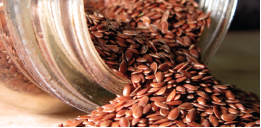The current study investigated usual dietary intakes of total and specific lignans with tumor characteristics. Dietary lignan intakes were calculated from food frequency questionnaires in 683 women with breast cancer and 611 healthy women without breast cancer enrolled in the Data Bank and BioRepository at Roswell Park Cancer Institute (RPCI). Clinicopathologic data were abstracted from the RPCI breast cancer database. Women in the highest versus the lowest tertile of total lignan intakes had a 40–50% lower odds of breast cancer regardless of menopausal status and substantially reduced odds of an invasive tumor, especially among premenopausal women (OR 0.48; 95% CI 0.26–0.86). Lignan intakes were inversely associated with the odds of grade three tumors among premenopausal women and with the risk of estrogen receptor (ER) negative (ER−) breast cancer among premenopausal women (OR 0.16; 95% CI 0.03–0.44) and particularly triple negative tumors (ER−, progesterone receptor negative, HER2 negative; OR 0.16; 95% CI 0.04–0.62). Significant differences in the contribution to these effects by specific lignans were found, especially matairesinol and lariciresinol. The authors concluded that higher lignan intakes were associated with lower risks of breast cancer with more favorable prognostic characteristics. J Nutr. 2012 Jan;142(1):91-8. PMID: 22113872









